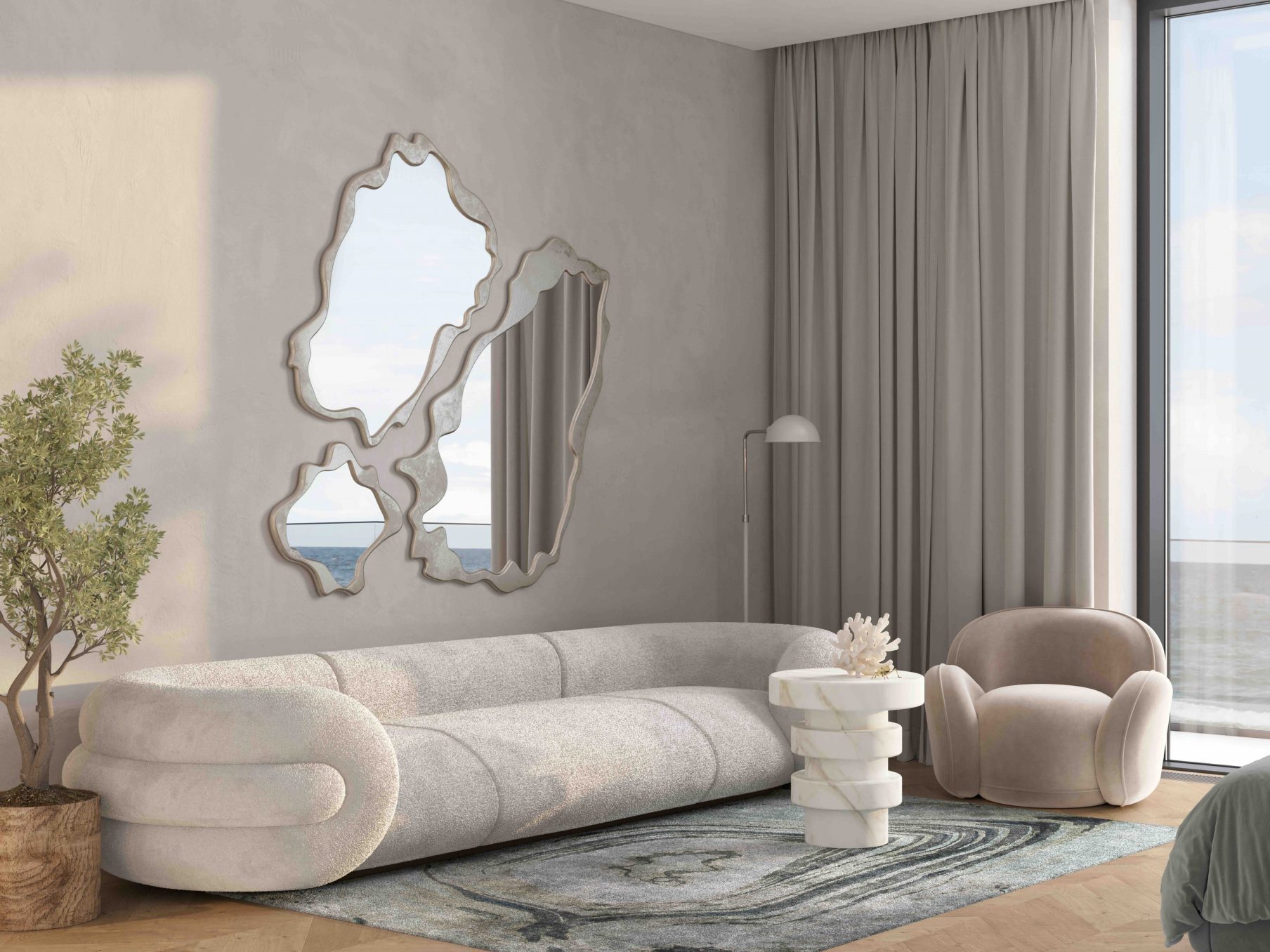
Image Credit: Caffe Latte
Keep your home cool in summer with these 18 hot weather hacks
We may be rejoicing about the appearance of the British summer (better late than never, sunshine), but the arrival of the hot weather can turn our normally comfortable homes into sweltering, sweaty spaces more akin to sunnier climes.
Following a somewhat soggy spring, it seems summer has finally arrived and we couldn’t be happier about it, but with the Met Office issuing extreme heat warnings across large areas of the UK this week, the battle is on to stay cool in our abodes.
If you’ve been tossing and turning in bed during these hotter than average summer nights, you’re definitely not alone with over half of us (51%) finding it hard to snooze in sticky times.
And let’s not forget working from home in the heat can become a challenge too, away from the soothing chill of an air-conditioned office.
“With the scorching hot weather taking a toll on the country at the moment, it is only natural that people are finding it harder to sleep and stay cool in these humid conditions,” explains Melissa Denham, Bedroom Design Expert at Hammonds Furniture.
“Although we can’t control how warm it is outside, there are several ways that we can mitigate the heat inside our homes, which begins with assessing your environment and making any amendments as necessary.”
In the last month alone, searches for ‘how to keep my home cool’ have skyrocketed by 114%. Thankfully, there are some simple yet effective hot weather hacks you can adopt to ensure the rooms in your home stay cool as the mercury rises.
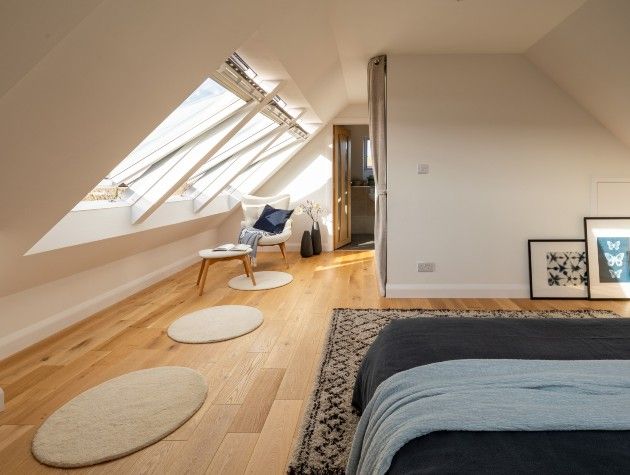
Harness some plant power
We know house plants have a calming influence in the home, but did you realise they have a cooling impact too? Plants release moisture into the air, which evaporates and cools the air around them.
“Go for some funky succulents or air plants that don’t need much water,” suggests interior designer and e-designer Amanda Foster at Foster Decor.
“These little green plants actually release moisture into the air, creating a natural cooling effect. Plus, they look great in geometric planters or hanging from the ceiling in macramé holders.”
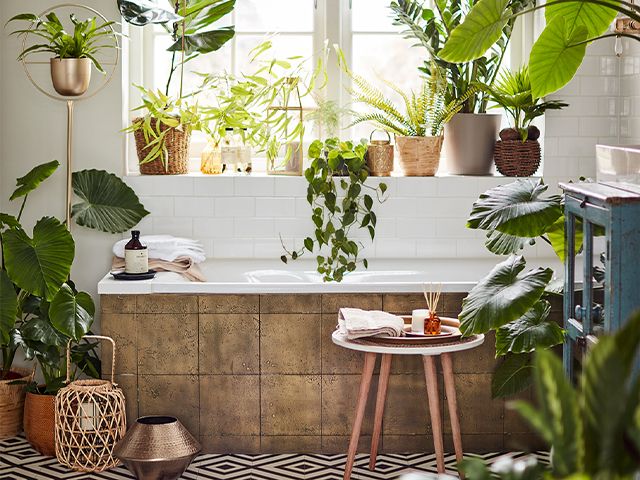
Flip your rugs
Sounds strange but most rugs have a lighter, more breathable underside.
“During a heatwave, turn them over for a cooler surface underfoot,” suggests Amanda. “It’s like giving your floors a summer makeover.”
Spritz your curtains
While swapping out your heavy curtains for some lightweight, moisture-wicking fabrics like bamboo or linen can help to keep your room cool, Amanda also recommends hanging them wet.
“As the water evaporates, it’ll cool the air around your windows,” she says. “It’s like your curtains are working double-duty as stylish air conditioners.”
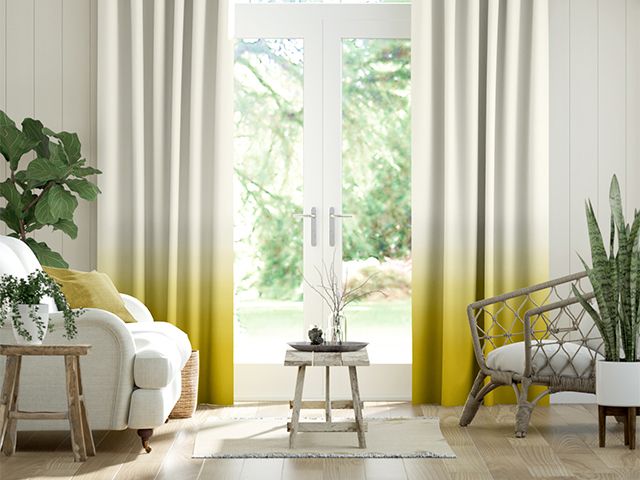
Create some cooling sculptures
Amanda suggests filling some quirky-shaped bottles or vases with water and freezing them.
“Place these icy art pieces around your room on trays to catch condensation,” she says. “As they melt, they’ll cool the air and add a touch of avant-garde to your décor.”
Harness the power of reflection
Strategically placed mirrors opposite windows will help bounce out heat-generating light.
“But don’t stop there – go for mirrored furniture or metallic accents to create a cool, futuristic vibe that literally reflects heat away,” advises Amanda.
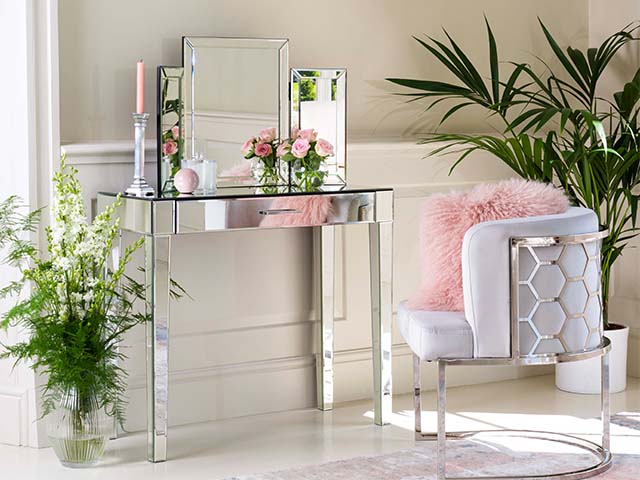
Make use of natural ventilation
We often think opening a window will cool us down, but actually, timing is crucial when it comes to how effective this method is when it is scorching outside.
“During the day, when the air is hot, you can keep the warmth out by shutting all of your windows and closing your blinds or curtains,” says Jon Bonnar, managing director at Cotswold Energy Group.
At night, when the air is much cooler, Jon suggests opening windows to let the cool breeze in.
“This natural ventilation method is free, environmentally friendly and an easy way to make your life more bearable when the temperature soars. Just be sure to close your windows each morning before the air starts to heat up.”
Jon says up to 30% of unwanted heat comes through your windows, so blocking the heat from coming in can reduce your bills by 10%, whilst lowering indoor temperatures by up to 20 degrees.
Open the right windows
As well as opening and closing your windows at the right time of day, it is also important to choose the right windows to open.
“Keeping windows on opposite sides of your house open can create a cross breeze, drawing cool air in and pushing hot air out,” explains Allan Reid, glass expert and founder of Art Windows and Doors.
“However, if both sides of your house face the sun during peak heat hours, opening them might just let in more hot air.”
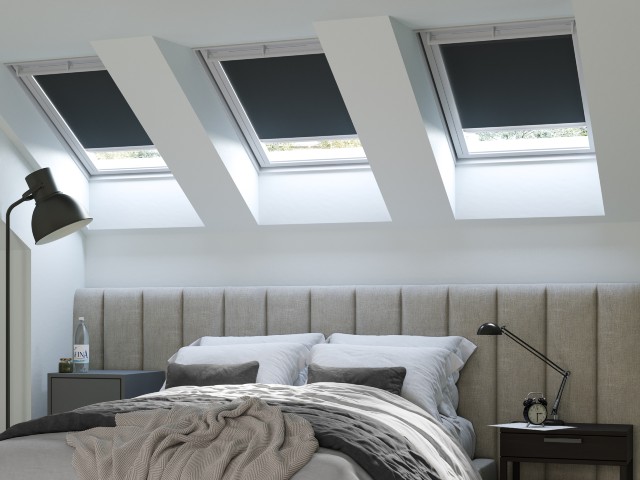
Make your fan more efficient with ice
Fans are a must when the hot weather spikes, but to make your fan more efficient, you could place a bowl of ice in front of it to reduce the temperature of your home by a few degrees.
“This whips up the water mist and blasts it around the room,” explains Jon. “Although this will only last as long as the ice and melted water stays cold. If you decide to use this method, always make sure you don’t leave the ice unattended to avoid any accidents.”
Sleep better with breathable bedding
Many switch to lighter tog duvets during summer in an effort to get a good night’s sleep, but don’t realise that the duvet cover may be impacting your sleep more than you’d think.
“Choosing fabrics that are lightweight and breathable may be the key to sweet dreams,” explains Miroslav Radov the founder of Rainbow Rubbish Removals.
Natural fabrics such as cotton, bamboo or linen are great alternatives for hotter nights.
“Linen as a fabric has cooling properties, it is very breathable, highly absorbable and even antimicrobial, all adding up to a sound night of sleep,” Miroslav adds.
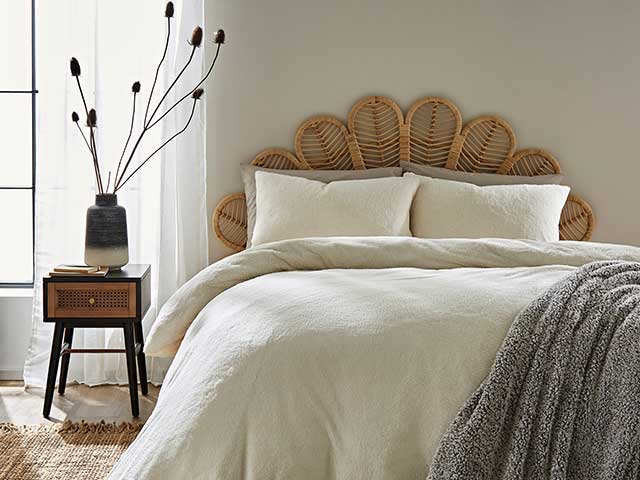
Clean and declutter
Not only does decluttering your space have mental and physical health benefits, but it will have knock-on effects on how your space copes with the summer heat.
“Clutter not only looks unsightly but is also known to absorb heat and restrict airflow, making your home temperatures soar,” Miroslav explains.
Whether you donate, sell or dispose of your clutter, getting rid of your unwanted items will not only clear your space but also your mind.
Use curtains and blinds to keep heat out
As much as we love the sunshine streaming in through the windows, in high temperatures you need to keep the heat out by closing your blinds, shutters or curtains.
“Keeping blinds or curtains shut during sunny days to cool your home down is far from a myth. In fact, 87% of heat gain comes through your windows making installing or upgrading your blinds and curtains the first step to keeping cool on a hot day,” Miroslav explains.
“Curtains are getting smarter, too. And many shops stock thermal curtains designed to help keep rooms cool in summer and warm in winter, so they do the hard work for you.”
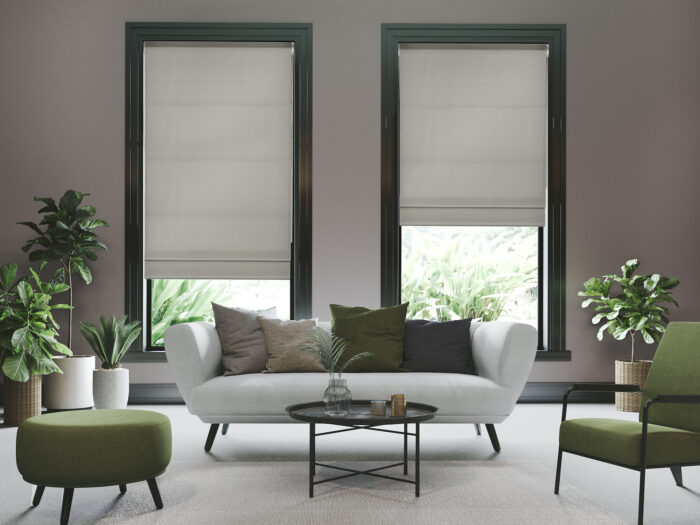
Replace old lightbulbs
Lightbulbs that are inefficient, such as traditional incandescent bulbs, will typically give off excess heat.
“Incandescent bulbs only use about 10% of the energy consumed for light, meaning 90% is therefore emitted as heat, making them one of the many reasons your home may be scorching,” Miroslav explains.
“Alternative bulbs such as LEDs produce significantly less heat and use less energy, making them a great choice for those looking for a more energy-efficient bulb with the rewards of less heat and more longevity.”
Switch off heat-emitting appliances
You might not realise it, but leaving your appliances on standby can contribute to the overall heat in your home.
“Turn off any electrical appliances when they’re not in use, such as your TV or laptop charger as these can generate a small amount of heat,” explains Hamid Salimi from Daikin UK.
“Also try to avoid using your laptop on your knees as this can very quickly build up heat on your legs.”
Using the oven or dishwasher can also add heat and humidity to your home, so Allan suggests trying to cook during cooler parts of the day or using alternative methods like a grill.
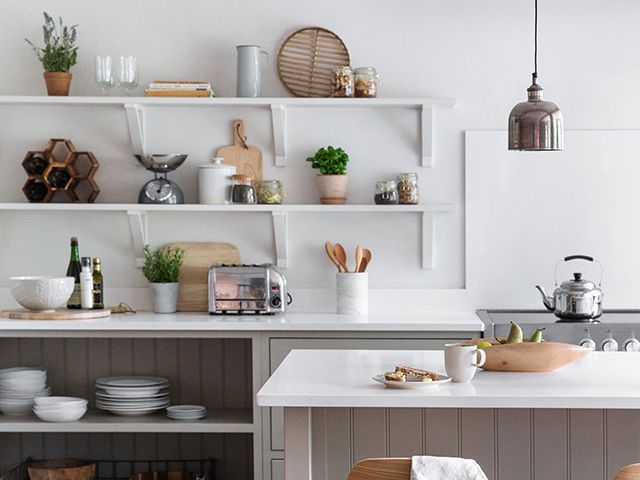
Try sun-shading techniques
Harness the power of shading to block out direct sunlight and prevent your home from heating up.
“Install exterior shades or plant trees around your home to provide natural shade and reduce solar heat gain,” suggests Johanna Constantinou, interior trends expert at Tapi Carpets & Floors.
She also suggests utilising window films indoors to block harsh sunlight during the hottest parts of the day, while still allowing natural light to filter through.
Choose cooling flooring options
Dark-coloured flooring materials tend to absorb more heat from sunlight than lighter-coloured ones.
“If you have dark flooring, consider placing reflective rugs or mats in high-traffic areas to reduce heat absorption and keep the space cooler,” Johanna suggests.
“Additionally, using light-coloured area rugs or floor coverings can help maintain a cooler indoor environment by reflecting sunlight rather than absorbing it.”
Choosing lightweight, breathable rugs made from natural fibres like cotton or bamboo will also allow for better air circulation and heat dissipation.
“By opting for cooling flooring options, you can contribute to a more pleasant indoor atmosphere while reducing the need for fans and air conditioning options,” Johanna adds.
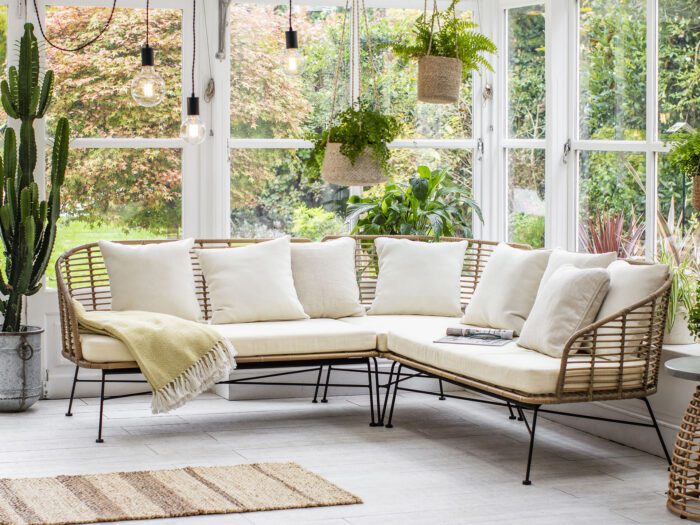
Seal windows and doors
Ensuring windows and doors are properly sealed will prevent warm air from entering and cool air from escaping.
“Use weather stripping or caulking to seal any gaps or cracks around window frames and doorways, improving energy efficiency and keeping your home cooler,” Johanna adds.
Improvise air conditioning
While installing an air conditioning (AC) unit could help adapt your home and keep it cool for the future, they aren’t great for the environment, and can be costly to run and install.
“The cost of buying and installing an AC unit can be anywhere from £500 to £2,500, depending on the type and size,” explains Jon.
“The cost of running an AC unit varies depending on the type, the cost of electricity and the size of your unit. Although, the longer it’s in use, the more it will cost. Uswitch figures suggest that using an AC unit for around nine hours per day will cost just under £60 per week.”
If you’re on a budget and looking for a more eco-friendly option, Jon suggests improvising some air conditioning instead by placing a wet sheet in front of an open window to cool the warm air as it enters your home.
“This would not only lower temperatures, but could save you around £45 per year on your energy bills,” he suggests. “However, this method will only last as long as the sheet stays wet.”
Use a cold water bottle
Hot water bottles aren’t just for keeping warm and managing pain, they can also help keep you cool.
“Take an old hot water bottle, fill it with cold water and then put it in the freezer,” suggests Jon.
“Once frozen, you can use this to keep you cool wherever you are in the house. To help you drift off, you could place it at the foot of your bed or underneath your pillow for a cooler night’s sleep.”
If you do choose this method to cool down, Jon advises being careful not to use it as a hot water bottle again though as freezing it may make it deteriorate quicker, meaning hot water will come out if you were to use it during winter and potentially scald you.
“You could even stick your sheets and pillowcases in the freezer during the day,” Jon adds. “And then put them back on your bedding at night to help cool you down while you sleep.”




